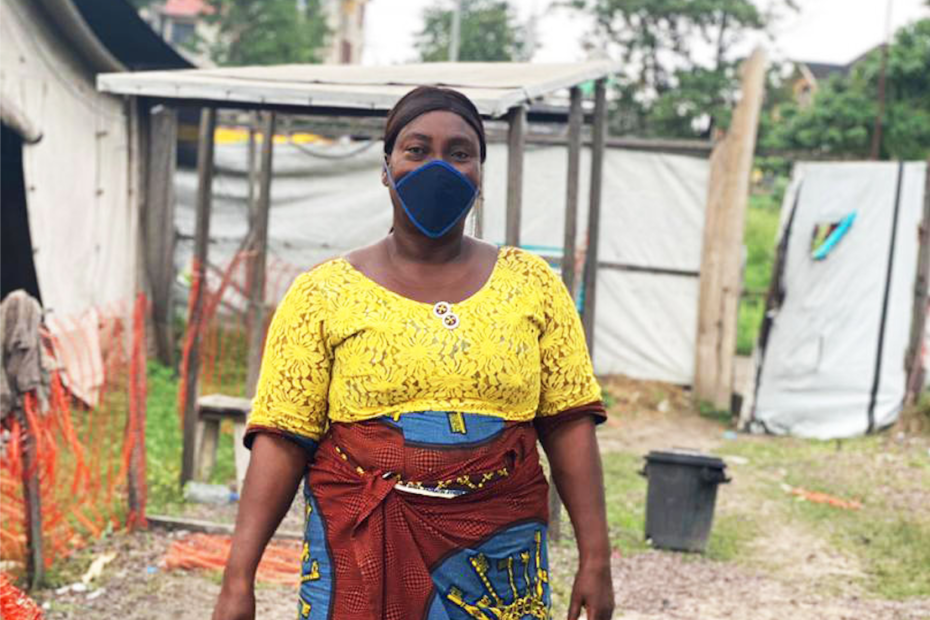“We only have a few pieces of hydro alcoholic gels and a small number of masks, but this is not enough. We need the protective materials to continue to do our service well.“
Bébé Bola, 48 years old, is a community health worker in the Limete health district in Kinshasa. She covers a township known as “Pakadjuma.” Bébé also serves as a nurse in the Cholera Treatment Center of the Limete health district and is the President of the Community Development Committee.
Why did you become a Community Health Worker?
I am a nurse and I wanted to work as a CHW just to help people, to be with them and to know their difficulties and their needs within the Pakadjuma community.
What was the process of becoming a CHW?
I wasn’t particularly trained when I became a CHW as I only was able to shadow other CHWs. I approached the former president of the Community Development Committee and other authorities of this health area. I asked them questions and they answered that there was no salary for this service, but I had no problem with the fact that this work was voluntary. I was determined to do it anyway. After that, we started working together during vaccination campaigns, conducting household visits and reporting any health issues back to the nurses at the health facility. That’s how my integration in the group of CHWs began and my interest in this line of work grew.
What does a day in the life of a CHW look like?
We usually meet in the health center at a fixed time and we plan our assignments. For example, we will make home visits [and] we go door to door to conduct disease surveillance, raise awareness and advise on diseases such as tuberculosis, malaria and other topics related to the [health] problems we have in our community. We meet first and agree on a plan: how many people will conduct household visits during the day, when to begin the household visits, and the number of households that each CHW needs to visit. Following household visits, we meet back at the health center, debrief on the visits, and write our reports. I would gather the report to submit to the head nurse at the health facility, who in turn, will submit [it] to the health district office.
How does your work as a CHW intersect with your work as a nurse?
My works as a CHW paved the way for my nursing job. I was a CHW even before becoming a nurse. Even though I went to nursing school, I couldn’t find any work. Thanks to the work of CHW, I was able to find my job as a nurse. Since I was working well, I was integrated in the health district at the time when the cholera epidemic started [in 2013 and then] I became a certified nurse in Kinshasa. I have already served this community as a [CHW] for 20 years and I am happy to work as a CHW. Everyone here loves me. They come to me when someone is in trouble, they come to me for solutions even at night. They look for me to help them. I have learned many things [and] this has been a plus in my life. I am building relationships with many people.
What is your role as a CHW during COVID?
Our main role is to raise awareness. We do not abandon our work, we continue to show people how to avoid the disease. The virus doesn’t walk by itself, it is carried by people and spread from one person to another. We continue to advise [the community] to respect social distancing, avoid shaking hands, [to] regularly wash hands and to respect the [preventive measures] to protect themselves from COVID-19. We are noticing some change.
What has your work been like during the COVID-19 pandemic?
Since being in the midst of the COVID-19 pandemic, the work has become a little more difficult to do because we are in the field every day raising awareness, tracing contacts [and] going door to door without having enough equipment to protect ourselves. This exposes us to the pandemic because we meet people who do not present the symptoms, but after you learn that they were infected with COVID-19. We only have a few pieces of hydro alcoholic gels and a small number of masks, but this is not enough. We need the protective materials to continue to do our service well.
Do you have the PPE you need?
We don’t have a lot of equipment for this pandemic, but the health district office helps us with gels [hand sanitizers] and masks but that is not always enough. Personally, for this second wave of pandemic, I need more protective equipment to protect myself and others. The community also asks me [to provide them with protective equipment] almost every day.
Track our PPE delivery across Africa helping CHWs like Bébé here.
